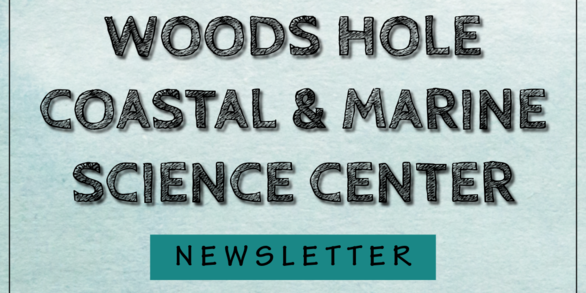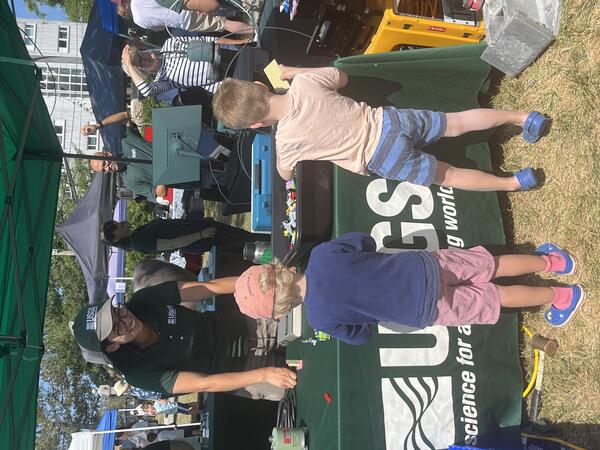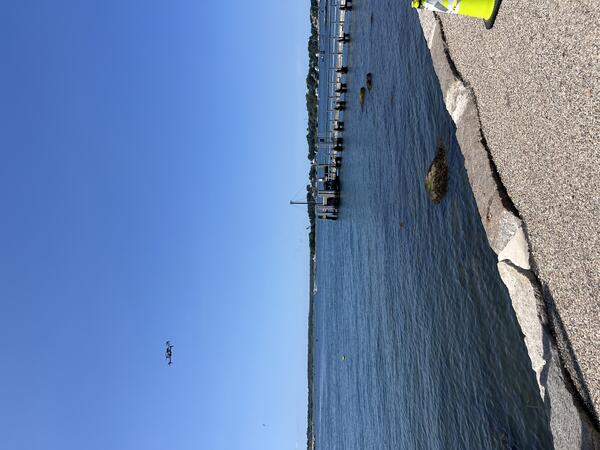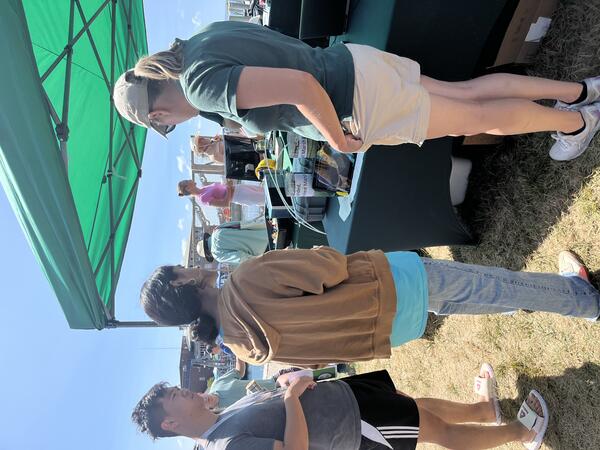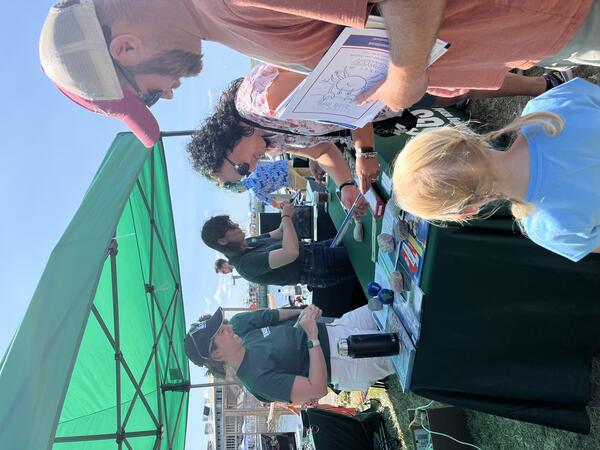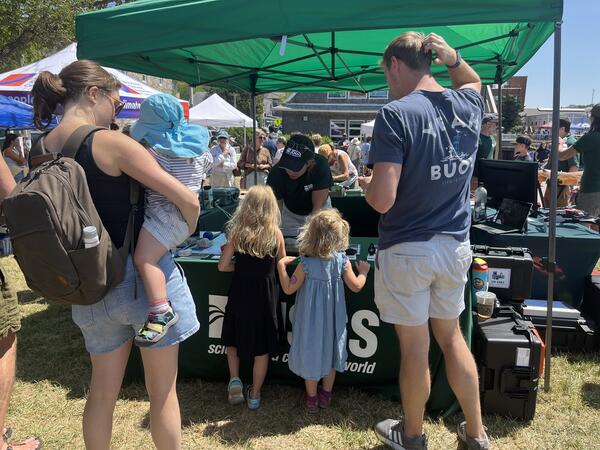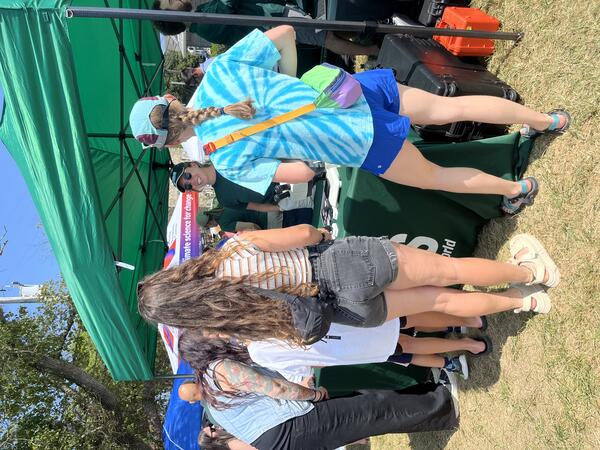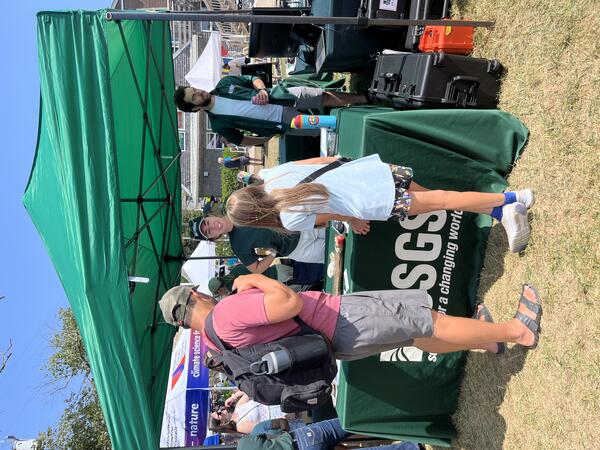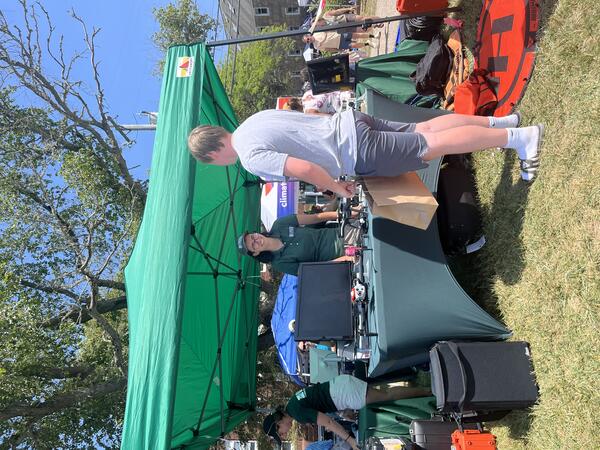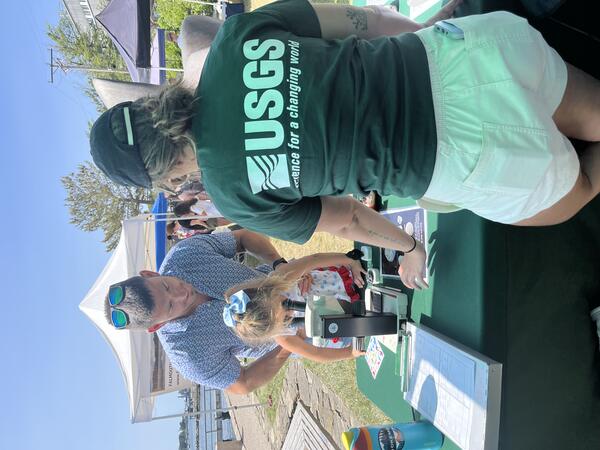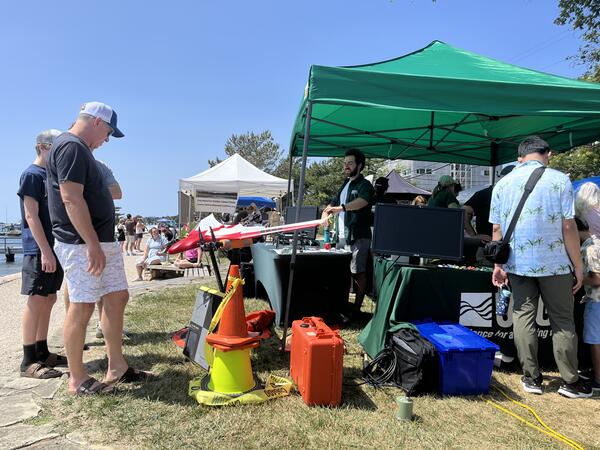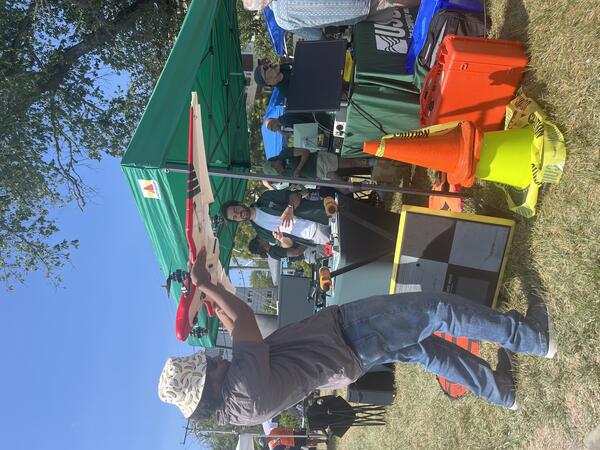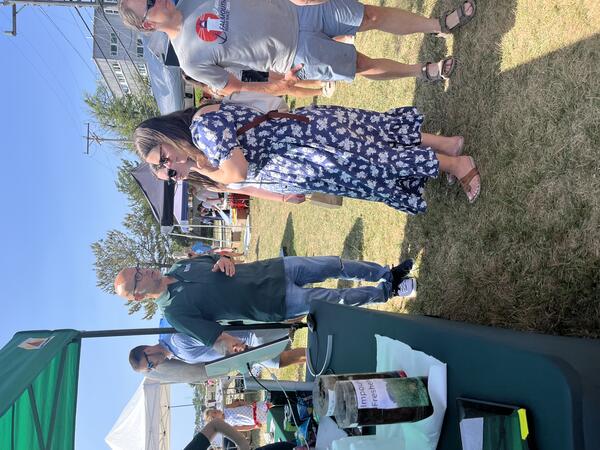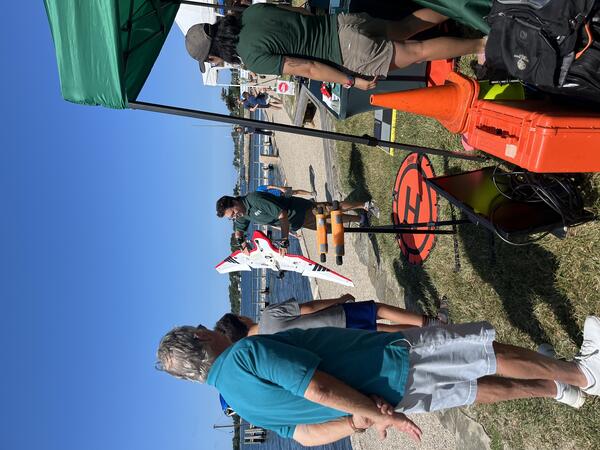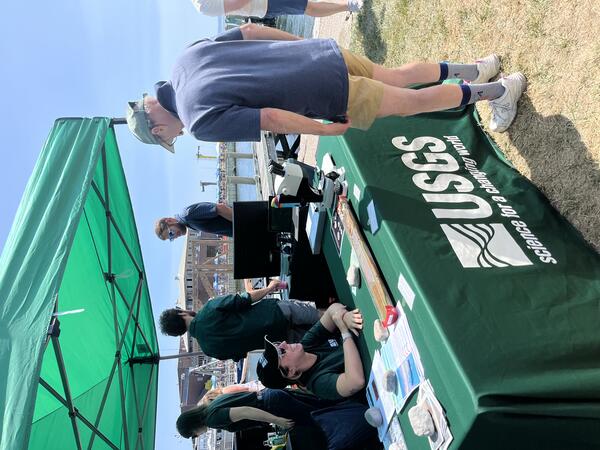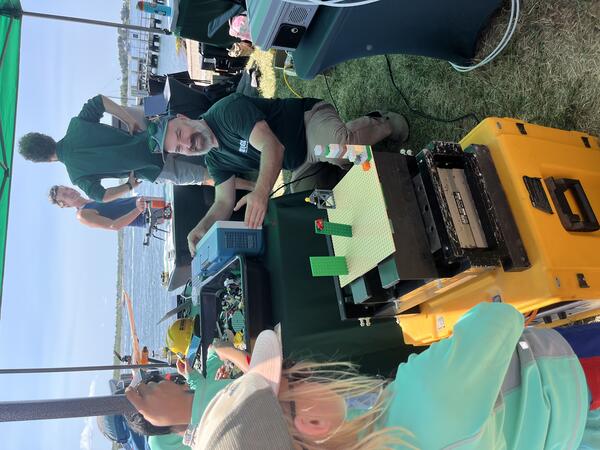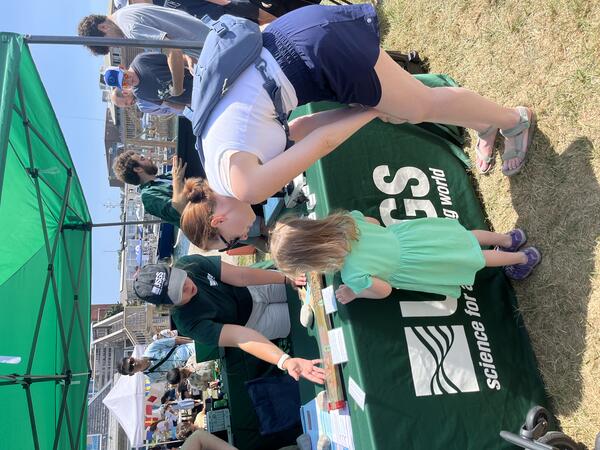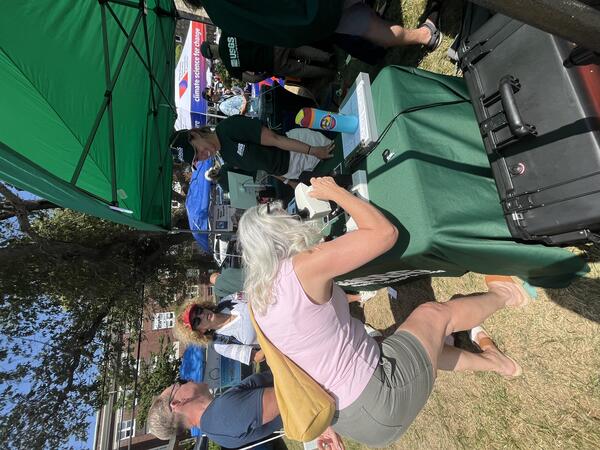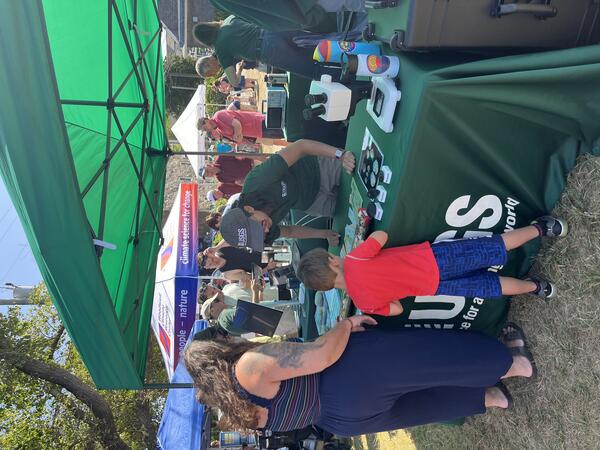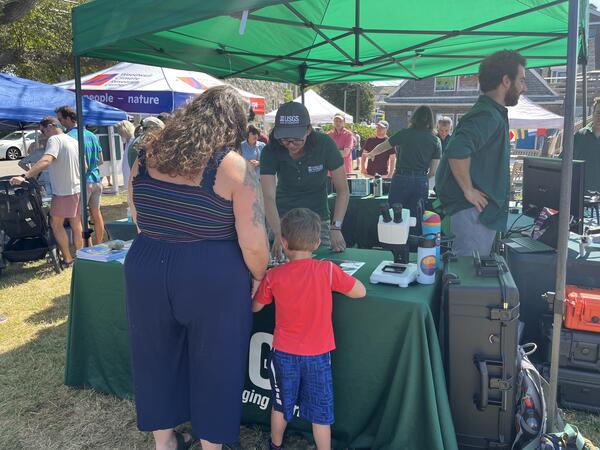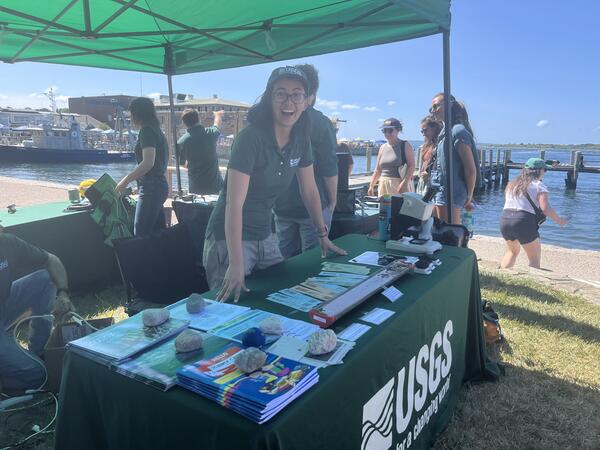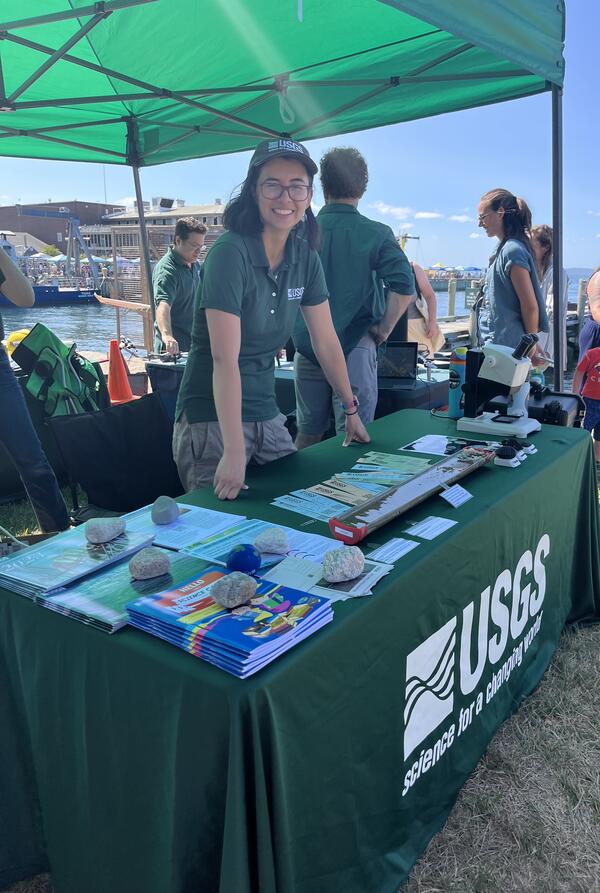Jin-Si Over watching kids enjoy the earthquake station at the 2025 Woods Hole Science Stroll on August 9, 2025. We setup a shake table that moves in different directions, at varying frequencies to demonstrate the power of earthquakes.
Sara Ernst
I am an Information Specialist at the Woods Hole Coastal and Marine Science Center. My goal is to bridge the communication gap between science and stakeholders – ensuring resource managers, planners, politicians, and the public have the information they need to make informed decisions.
Great science done invisibly cannot have impact.
As the Information Specialist for the Woods Hole Coastal and Marine Science Center, I lead communications and outreach efforts to help increase awareness and use of our coastal and marine research, data, and tools.
With over a decade of experience as a science communicator, I am adept at writing engaging science stories and creating visually appealing communications products for target audiences.
Professional Experience
Information Specialist, U.S. Geological Survey, Woods Hole Coastal and Marine Science Center, 2018 - Present.
Science Communications Specialist, Environmental Protection Agency, 2015 - 2018.
Education and Certifications
B.S. Marine Affairs, University of Rhode Island, 2013.
Honors and Awards
1st place brochure, National Association of Government Communicators Blue Pencil and Gold Screen Awards, 2025.
3rd place technical or statistical report, National Association of Government Communicators Blue Pencil and Gold Screen Awards, 2025.
2022 Shoemaker Award for Communications Product Excellence, audio/visual category
1st place annual report, National Association of Government Communicators Blue Pencil and Gold Screen Awards, 2021.
1st place electronic publication, National Association of Government Communicators Blue Pencil and Gold Screen Awards, 2020.
1st place soft or hard book, National Association of Government Communicators Blue Pencil and Gold Screen Awards, 2020.
Science and Products
Woods Hole Coastal and Marine Science Center—2023 annual report Woods Hole Coastal and Marine Science Center—2023 annual report
Coastal Science Navigator companion guide—Discover the U.S. Geological Survey coastal science products you need Coastal Science Navigator companion guide—Discover the U.S. Geological Survey coastal science products you need
Woods Hole Coastal and Marine Science Center—2022 annual report Woods Hole Coastal and Marine Science Center—2022 annual report
Woods Hole Coastal and Marine Science Center — 2021 Annual Report Woods Hole Coastal and Marine Science Center — 2021 Annual Report
Woods Hole Coastal and Marine Science Center—2020 annual report Woods Hole Coastal and Marine Science Center—2020 annual report
Woods Hole Coastal and Marine Science Center—2019 annual report Woods Hole Coastal and Marine Science Center—2019 annual report
Woods Hole Coastal and Marine Science Center—2018 annual report Woods Hole Coastal and Marine Science Center—2018 annual report
Coastal and marine science of the U.S. Geological Survey in Woods Hole, Massachusetts Coastal and marine science of the U.S. Geological Survey in Woods Hole, Massachusetts
State of Our Nation's Coast
Coastal Change Hazards
Jin-Si Over watching kids enjoy the earthquake station at the 2025 Woods Hole Science Stroll on August 9, 2025. We setup a shake table that moves in different directions, at varying frequencies to demonstrate the power of earthquakes.
The Aerial Imaging and Mapping Group showcased uncrewed aircraft system technology (drones) of all sizes and talked about how they’re used to map short- and long-term changes in coastal landscapes. The group also flew one of the drones to demonstrate how they’re piloted.
The Aerial Imaging and Mapping Group showcased uncrewed aircraft system technology (drones) of all sizes and talked about how they’re used to map short- and long-term changes in coastal landscapes. The group also flew one of the drones to demonstrate how they’re piloted.
Meagan Eagle used a gas analyzer and respiration chamber to demonstrate the role of salt marshes in carbon sequestration.
Meagan Eagle used a gas analyzer and respiration chamber to demonstrate the role of salt marshes in carbon sequestration.
The Science Career coloring books were super popular at the 2025 Woods Hole Science Stroll.
The Science Career coloring books were super popular at the 2025 Woods Hole Science Stroll.
Marie Bartlett showing a family a core sample replica that displays how sediment core samples provide a layered record of past environments, climate, and geological events. 3D printed microfossils found in marine cores, such as forams and diatoms, were also on display.
Marie Bartlett showing a family a core sample replica that displays how sediment core samples provide a layered record of past environments, climate, and geological events. 3D printed microfossils found in marine cores, such as forams and diatoms, were also on display.
Marie Bartlett at the 2025 Woods Hole Science Stroll on August 9, 2025. During this free event, a variety of booths line the streets, docks, and Waterfront Park to deliver hands-on science activities, games, demonstrations, and more to visitors of all ages.
Marie Bartlett at the 2025 Woods Hole Science Stroll on August 9, 2025. During this free event, a variety of booths line the streets, docks, and Waterfront Park to deliver hands-on science activities, games, demonstrations, and more to visitors of all ages.
Marie Bartlett at the microscope station where visitors could look at foraminifera, tiny microfossils that live in marine environments. Scientists at the USGS use foraminifera to determine the age of sediment found many meters below the seafloor and to learn more about past climate conditions.
Marie Bartlett at the microscope station where visitors could look at foraminifera, tiny microfossils that live in marine environments. Scientists at the USGS use foraminifera to determine the age of sediment found many meters below the seafloor and to learn more about past climate conditions.
Jin-Si over talking about using drones for coastal mapping. The Aerial Imaging and Mapping Group showcased uncrewed aircraft system technology (drones) of all sizes and talked about how they’re used to map short- and long-term changes in coastal landscapes. The group also flew one of the drones to demonstrate how they’re piloted.
Jin-Si over talking about using drones for coastal mapping. The Aerial Imaging and Mapping Group showcased uncrewed aircraft system technology (drones) of all sizes and talked about how they’re used to map short- and long-term changes in coastal landscapes. The group also flew one of the drones to demonstrate how they’re piloted.
Marie Bartlett teaching visitors about foraminifera, tiny microfossils that live in marine environments. Scientists at the USGS use foraminifera to determine the age of sediment found many meters below the seafloor and to learn more about past climate conditions.
Marie Bartlett teaching visitors about foraminifera, tiny microfossils that live in marine environments. Scientists at the USGS use foraminifera to determine the age of sediment found many meters below the seafloor and to learn more about past climate conditions.
Amit Millo showing off one of our drones at the 2025 Woods Hole Science Stroll on August 9, 2025.
Amit Millo showing off one of our drones at the 2025 Woods Hole Science Stroll on August 9, 2025.
Checking out one of our drones! The Aerial Imaging and Mapping Group showcased uncrewed aircraft system technology (drones) of all sizes and talked about how they’re used to map short- and long-term changes in coastal landscapes. The group also flew one of the drones to demonstrate how they’re piloted.
Checking out one of our drones! The Aerial Imaging and Mapping Group showcased uncrewed aircraft system technology (drones) of all sizes and talked about how they’re used to map short- and long-term changes in coastal landscapes. The group also flew one of the drones to demonstrate how they’re piloted.
Zafer Defne discussed ocean and coastal dynamics with attendees and provided details about the COAWST modeling system. The COAWST model allows many sophisticated models to work together to accurately simulate physical processes during a storm.
Zafer Defne discussed ocean and coastal dynamics with attendees and provided details about the COAWST modeling system. The COAWST model allows many sophisticated models to work together to accurately simulate physical processes during a storm.
Seth Ackerman showing off one of our drones at the 2025 Woods Hole Science Stroll on August 9, 2025. During this free event, a variety of booths line the streets, docks, and Waterfront Park to deliver hands-on science activities, games, demonstrations, and more to visitors of all ages.
Seth Ackerman showing off one of our drones at the 2025 Woods Hole Science Stroll on August 9, 2025. During this free event, a variety of booths line the streets, docks, and Waterfront Park to deliver hands-on science activities, games, demonstrations, and more to visitors of all ages.
Marie Bartlett at the 2025 Woods Hole Science Stroll on August 9, 2025. During this free event, a variety of booths line the streets, docks, and Waterfront Park to deliver hands-on science activities, games, demonstrations, and more to visitors of all ages.
Marie Bartlett at the 2025 Woods Hole Science Stroll on August 9, 2025. During this free event, a variety of booths line the streets, docks, and Waterfront Park to deliver hands-on science activities, games, demonstrations, and more to visitors of all ages.
Anxiously waiting to see how the Lego structure does on the shake table! We setup a shake table that moves in different directions, at varying frequencies to demonstrate the power of earthquakes. People built structures out of Legos to put on the shake table to test how buildings, bridges, and other infrastructure would behave during a real seismic event.
Anxiously waiting to see how the Lego structure does on the shake table! We setup a shake table that moves in different directions, at varying frequencies to demonstrate the power of earthquakes. People built structures out of Legos to put on the shake table to test how buildings, bridges, and other infrastructure would behave during a real seismic event.
Marie Bartlett showing off our replica sediment core at the Woods Hole Science Stroll.
Marie Bartlett showing off our replica sediment core at the Woods Hole Science Stroll.
Enjoying the microscope station where visitors could look at foraminifera, tiny microfossils that live in marine environments. Scientists at the USGS use foraminifera to determine the age of sediment found many meters below the seafloor and to learn more about past climate conditions.
Enjoying the microscope station where visitors could look at foraminifera, tiny microfossils that live in marine environments. Scientists at the USGS use foraminifera to determine the age of sediment found many meters below the seafloor and to learn more about past climate conditions.
Jin-Si Over at the 2025 Woods Hole Science Stroll on August 9, 2025. During this free event, a variety of booths line the streets, docks, and Waterfront Park to deliver hands-on science activities, games, demonstrations, and more to visitors of all ages.
Jin-Si Over at the 2025 Woods Hole Science Stroll on August 9, 2025. During this free event, a variety of booths line the streets, docks, and Waterfront Park to deliver hands-on science activities, games, demonstrations, and more to visitors of all ages.
Jin-Si Over at the 2025 Woods Hole Science Stroll on August 9, 2025. During this free event, a variety of booths line the streets, docks, and Waterfront Park to deliver hands-on science activities, games, demonstrations, and more to visitors of all ages.
Jin-Si Over at the 2025 Woods Hole Science Stroll on August 9, 2025. During this free event, a variety of booths line the streets, docks, and Waterfront Park to deliver hands-on science activities, games, demonstrations, and more to visitors of all ages.
Jin-Si Over at the 2025 Woods Hole Science Stroll on August 9, 2025. During this free event, a variety of booths line the streets, docks, and Waterfront Park to deliver hands-on science activities, games, demonstrations, and more to visitors of all ages.
Jin-Si Over at the 2025 Woods Hole Science Stroll on August 9, 2025. During this free event, a variety of booths line the streets, docks, and Waterfront Park to deliver hands-on science activities, games, demonstrations, and more to visitors of all ages.
Jin-Si Over at the 2025 Woods Hole Science Stroll on August 9, 2025. During this free event, a variety of booths line the streets, docks, and Waterfront Park to deliver hands-on science activities, games, demonstrations, and more to visitors of all ages.
Jin-Si Over at the 2025 Woods Hole Science Stroll on August 9, 2025. During this free event, a variety of booths line the streets, docks, and Waterfront Park to deliver hands-on science activities, games, demonstrations, and more to visitors of all ages.
U.S. Coastal Wetland Synthesis Applications Geonarrative U.S. Coastal Wetland Synthesis Applications Geonarrative
Woods Hole Coastal and Marine Science Center 2020 Annual Report Woods Hole Coastal and Marine Science Center 2020 Annual Report
Science and Products
Woods Hole Coastal and Marine Science Center—2023 annual report Woods Hole Coastal and Marine Science Center—2023 annual report
Coastal Science Navigator companion guide—Discover the U.S. Geological Survey coastal science products you need Coastal Science Navigator companion guide—Discover the U.S. Geological Survey coastal science products you need
Woods Hole Coastal and Marine Science Center—2022 annual report Woods Hole Coastal and Marine Science Center—2022 annual report
Woods Hole Coastal and Marine Science Center — 2021 Annual Report Woods Hole Coastal and Marine Science Center — 2021 Annual Report
Woods Hole Coastal and Marine Science Center—2020 annual report Woods Hole Coastal and Marine Science Center—2020 annual report
Woods Hole Coastal and Marine Science Center—2019 annual report Woods Hole Coastal and Marine Science Center—2019 annual report
Woods Hole Coastal and Marine Science Center—2018 annual report Woods Hole Coastal and Marine Science Center—2018 annual report
Coastal and marine science of the U.S. Geological Survey in Woods Hole, Massachusetts Coastal and marine science of the U.S. Geological Survey in Woods Hole, Massachusetts
State of Our Nation's Coast
Coastal Change Hazards
Jin-Si Over watching kids enjoy the earthquake station at the 2025 Woods Hole Science Stroll on August 9, 2025. We setup a shake table that moves in different directions, at varying frequencies to demonstrate the power of earthquakes.
Jin-Si Over watching kids enjoy the earthquake station at the 2025 Woods Hole Science Stroll on August 9, 2025. We setup a shake table that moves in different directions, at varying frequencies to demonstrate the power of earthquakes.
The Aerial Imaging and Mapping Group showcased uncrewed aircraft system technology (drones) of all sizes and talked about how they’re used to map short- and long-term changes in coastal landscapes. The group also flew one of the drones to demonstrate how they’re piloted.
The Aerial Imaging and Mapping Group showcased uncrewed aircraft system technology (drones) of all sizes and talked about how they’re used to map short- and long-term changes in coastal landscapes. The group also flew one of the drones to demonstrate how they’re piloted.
Meagan Eagle used a gas analyzer and respiration chamber to demonstrate the role of salt marshes in carbon sequestration.
Meagan Eagle used a gas analyzer and respiration chamber to demonstrate the role of salt marshes in carbon sequestration.
The Science Career coloring books were super popular at the 2025 Woods Hole Science Stroll.
The Science Career coloring books were super popular at the 2025 Woods Hole Science Stroll.
Marie Bartlett showing a family a core sample replica that displays how sediment core samples provide a layered record of past environments, climate, and geological events. 3D printed microfossils found in marine cores, such as forams and diatoms, were also on display.
Marie Bartlett showing a family a core sample replica that displays how sediment core samples provide a layered record of past environments, climate, and geological events. 3D printed microfossils found in marine cores, such as forams and diatoms, were also on display.
Marie Bartlett at the 2025 Woods Hole Science Stroll on August 9, 2025. During this free event, a variety of booths line the streets, docks, and Waterfront Park to deliver hands-on science activities, games, demonstrations, and more to visitors of all ages.
Marie Bartlett at the 2025 Woods Hole Science Stroll on August 9, 2025. During this free event, a variety of booths line the streets, docks, and Waterfront Park to deliver hands-on science activities, games, demonstrations, and more to visitors of all ages.
Marie Bartlett at the microscope station where visitors could look at foraminifera, tiny microfossils that live in marine environments. Scientists at the USGS use foraminifera to determine the age of sediment found many meters below the seafloor and to learn more about past climate conditions.
Marie Bartlett at the microscope station where visitors could look at foraminifera, tiny microfossils that live in marine environments. Scientists at the USGS use foraminifera to determine the age of sediment found many meters below the seafloor and to learn more about past climate conditions.
Jin-Si over talking about using drones for coastal mapping. The Aerial Imaging and Mapping Group showcased uncrewed aircraft system technology (drones) of all sizes and talked about how they’re used to map short- and long-term changes in coastal landscapes. The group also flew one of the drones to demonstrate how they’re piloted.
Jin-Si over talking about using drones for coastal mapping. The Aerial Imaging and Mapping Group showcased uncrewed aircraft system technology (drones) of all sizes and talked about how they’re used to map short- and long-term changes in coastal landscapes. The group also flew one of the drones to demonstrate how they’re piloted.
Marie Bartlett teaching visitors about foraminifera, tiny microfossils that live in marine environments. Scientists at the USGS use foraminifera to determine the age of sediment found many meters below the seafloor and to learn more about past climate conditions.
Marie Bartlett teaching visitors about foraminifera, tiny microfossils that live in marine environments. Scientists at the USGS use foraminifera to determine the age of sediment found many meters below the seafloor and to learn more about past climate conditions.
Amit Millo showing off one of our drones at the 2025 Woods Hole Science Stroll on August 9, 2025.
Amit Millo showing off one of our drones at the 2025 Woods Hole Science Stroll on August 9, 2025.
Checking out one of our drones! The Aerial Imaging and Mapping Group showcased uncrewed aircraft system technology (drones) of all sizes and talked about how they’re used to map short- and long-term changes in coastal landscapes. The group also flew one of the drones to demonstrate how they’re piloted.
Checking out one of our drones! The Aerial Imaging and Mapping Group showcased uncrewed aircraft system technology (drones) of all sizes and talked about how they’re used to map short- and long-term changes in coastal landscapes. The group also flew one of the drones to demonstrate how they’re piloted.
Zafer Defne discussed ocean and coastal dynamics with attendees and provided details about the COAWST modeling system. The COAWST model allows many sophisticated models to work together to accurately simulate physical processes during a storm.
Zafer Defne discussed ocean and coastal dynamics with attendees and provided details about the COAWST modeling system. The COAWST model allows many sophisticated models to work together to accurately simulate physical processes during a storm.
Seth Ackerman showing off one of our drones at the 2025 Woods Hole Science Stroll on August 9, 2025. During this free event, a variety of booths line the streets, docks, and Waterfront Park to deliver hands-on science activities, games, demonstrations, and more to visitors of all ages.
Seth Ackerman showing off one of our drones at the 2025 Woods Hole Science Stroll on August 9, 2025. During this free event, a variety of booths line the streets, docks, and Waterfront Park to deliver hands-on science activities, games, demonstrations, and more to visitors of all ages.
Marie Bartlett at the 2025 Woods Hole Science Stroll on August 9, 2025. During this free event, a variety of booths line the streets, docks, and Waterfront Park to deliver hands-on science activities, games, demonstrations, and more to visitors of all ages.
Marie Bartlett at the 2025 Woods Hole Science Stroll on August 9, 2025. During this free event, a variety of booths line the streets, docks, and Waterfront Park to deliver hands-on science activities, games, demonstrations, and more to visitors of all ages.
Anxiously waiting to see how the Lego structure does on the shake table! We setup a shake table that moves in different directions, at varying frequencies to demonstrate the power of earthquakes. People built structures out of Legos to put on the shake table to test how buildings, bridges, and other infrastructure would behave during a real seismic event.
Anxiously waiting to see how the Lego structure does on the shake table! We setup a shake table that moves in different directions, at varying frequencies to demonstrate the power of earthquakes. People built structures out of Legos to put on the shake table to test how buildings, bridges, and other infrastructure would behave during a real seismic event.
Marie Bartlett showing off our replica sediment core at the Woods Hole Science Stroll.
Marie Bartlett showing off our replica sediment core at the Woods Hole Science Stroll.
Enjoying the microscope station where visitors could look at foraminifera, tiny microfossils that live in marine environments. Scientists at the USGS use foraminifera to determine the age of sediment found many meters below the seafloor and to learn more about past climate conditions.
Enjoying the microscope station where visitors could look at foraminifera, tiny microfossils that live in marine environments. Scientists at the USGS use foraminifera to determine the age of sediment found many meters below the seafloor and to learn more about past climate conditions.
Jin-Si Over at the 2025 Woods Hole Science Stroll on August 9, 2025. During this free event, a variety of booths line the streets, docks, and Waterfront Park to deliver hands-on science activities, games, demonstrations, and more to visitors of all ages.
Jin-Si Over at the 2025 Woods Hole Science Stroll on August 9, 2025. During this free event, a variety of booths line the streets, docks, and Waterfront Park to deliver hands-on science activities, games, demonstrations, and more to visitors of all ages.
Jin-Si Over at the 2025 Woods Hole Science Stroll on August 9, 2025. During this free event, a variety of booths line the streets, docks, and Waterfront Park to deliver hands-on science activities, games, demonstrations, and more to visitors of all ages.
Jin-Si Over at the 2025 Woods Hole Science Stroll on August 9, 2025. During this free event, a variety of booths line the streets, docks, and Waterfront Park to deliver hands-on science activities, games, demonstrations, and more to visitors of all ages.
Jin-Si Over at the 2025 Woods Hole Science Stroll on August 9, 2025. During this free event, a variety of booths line the streets, docks, and Waterfront Park to deliver hands-on science activities, games, demonstrations, and more to visitors of all ages.
Jin-Si Over at the 2025 Woods Hole Science Stroll on August 9, 2025. During this free event, a variety of booths line the streets, docks, and Waterfront Park to deliver hands-on science activities, games, demonstrations, and more to visitors of all ages.
Jin-Si Over at the 2025 Woods Hole Science Stroll on August 9, 2025. During this free event, a variety of booths line the streets, docks, and Waterfront Park to deliver hands-on science activities, games, demonstrations, and more to visitors of all ages.
Jin-Si Over at the 2025 Woods Hole Science Stroll on August 9, 2025. During this free event, a variety of booths line the streets, docks, and Waterfront Park to deliver hands-on science activities, games, demonstrations, and more to visitors of all ages.



